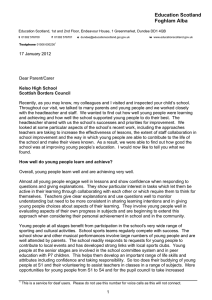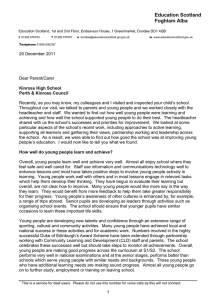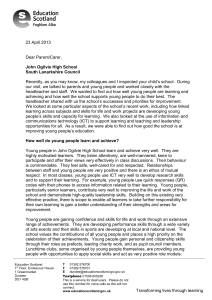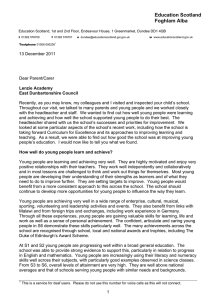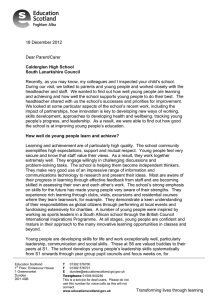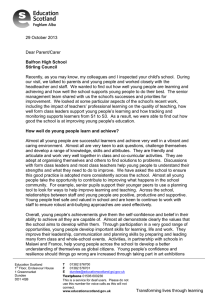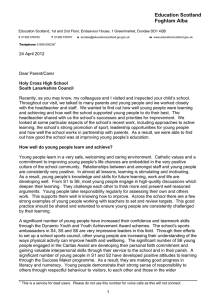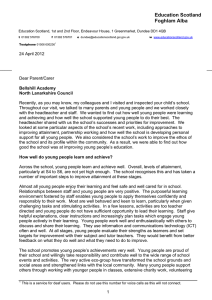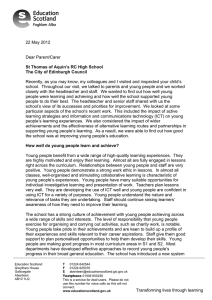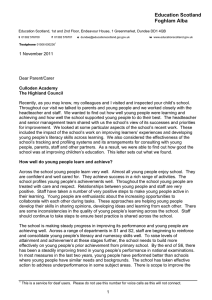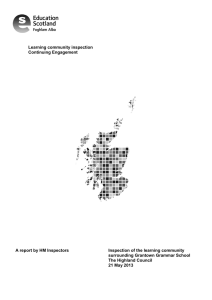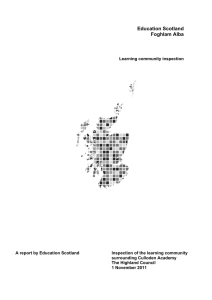Education Scotland Foghlam Alba
advertisement
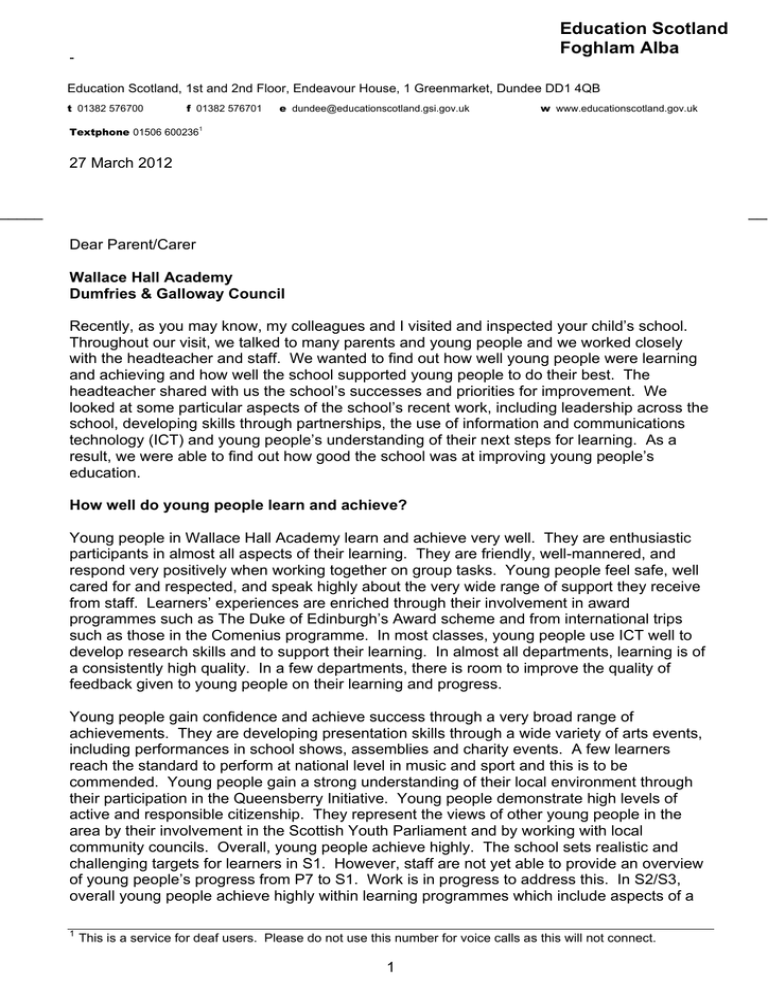
Education Scotland Foghlam Alba - Education Scotland, 1st and 2nd Floor, Endeavour House, 1 Greenmarket, Dundee DD1 4QB t 01382 576700 f 01382 576701 Textphone 01506 600236 e dundee@educationscotland.gsi.gov.uk w www.educationscotland.gov.uk 1 27 March 2012 _____ ___ Dear Parent/Carer Wallace Hall Academy Dumfries & Galloway Council Recently, as you may know, my colleagues and I visited and inspected your child’s school. Throughout our visit, we talked to many parents and young people and we worked closely with the headteacher and staff. We wanted to find out how well young people were learning and achieving and how well the school supported young people to do their best. The headteacher shared with us the school’s successes and priorities for improvement. We looked at some particular aspects of the school’s recent work, including leadership across the school, developing skills through partnerships, the use of information and communications technology (ICT) and young people’s understanding of their next steps for learning. As a result, we were able to find out how good the school was at improving young people’s education. How well do young people learn and achieve? Young people in Wallace Hall Academy learn and achieve very well. They are enthusiastic participants in almost all aspects of their learning. They are friendly, well-mannered, and respond very positively when working together on group tasks. Young people feel safe, well cared for and respected, and speak highly about the very wide range of support they receive from staff. Learners’ experiences are enriched through their involvement in award programmes such as The Duke of Edinburgh’s Award scheme and from international trips such as those in the Comenius programme. In most classes, young people use ICT well to develop research skills and to support their learning. In almost all departments, learning is of a consistently high quality. In a few departments, there is room to improve the quality of feedback given to young people on their learning and progress. Young people gain confidence and achieve success through a very broad range of achievements. They are developing presentation skills through a wide variety of arts events, including performances in school shows, assemblies and charity events. A few learners reach the standard to perform at national level in music and sport and this is to be commended. Young people gain a strong understanding of their local environment through their participation in the Queensberry Initiative. Young people demonstrate high levels of active and responsible citizenship. They represent the views of other young people in the area by their involvement in the Scottish Youth Parliament and by working with local community councils. Overall, young people achieve highly. The school sets realistic and challenging targets for learners in S1. However, staff are not yet able to provide an overview of young people’s progress from P7 to S1. Work is in progress to address this. In S2/S3, overall young people achieve highly within learning programmes which include aspects of a 1 This is a service for deaf users. Please do not use this number for voice calls as this will not connect. 1 broad general education. At S3, the school performs very well in national qualifications. Staff are working towards strengthening how they track young people’s progress. At S4 to S6, results in national qualifications are consistently above national averages and significantly better than in schools serving young people with similar needs and backgrounds. Staff need to continue their work to share information on young people’s progress in literacy, numeracy and health and wellbeing. Almost all school leavers enter further or higher education, training or employment when they leave school. How well does the school support young people to develop and learn? The support which young people receive to help them develop and learn is a major strength of the school. The curriculum reflects the school’s vision “Working together to achieve more”. An effective range of partnerships and out-of-class activities extend the curriculum and offer wider choice. These include using computer games, a range of sporting clubs, and various music groups. Young people experience some well-planned work to link their learning across different subject areas. The school librarian supports young people and staff very well, helping everyone to develop further their knowledge and extend their research and information handling skills. Young people are prepared well for leaving school through completing customised work experience placements. The school needs now to further increase its pace of change within the broad general education. Young people in S2 and S3 are presented for Intermediate and Standard Grade qualifications earlier than normally expected. This approach does not provide young people with their entitlement to a broad general education. The inspection provided the opportunity for the school to consider how to get the best for young people from Curriculum for Excellence. The school has clear plans to review and further develop the curriculum in S2 and S3 in line with national expectations. The senior phase curriculum provides a range of provision and flexible pathways which meets all learners’ needs. The Parent Council and other stakeholders provide valued support, including acting as business mentors and holding very helpful fundraising activities. Most teachers offer clear explanations and develop young people’s inquiry skills through effective questioning. Corridor displays and newsletters are used very well to recognise achievement. Young people are very proud of their school and the part it plays in developing them as learners. Across the school, most staff provide tasks, activities and resources which meet young people’s needs well. Young people who need additional support plans are making good progress. In almost all departments, there is a high standard of additional support which is very effective for those who require it. Senior pupils act as mentors and provide helpful subject workshops. In a few subjects, the pace of learning is too slow and learners are too passive. How well does the school improve the quality of its work? The headteacher is a highly-effective leader who is very supportive of his staff and committed to providing the highest standards for all learners. He is supported by strong able deputes who provide high-quality leadership. Across the school most staff, including unpromoted staff, lead change and improvement well. There is strong teamwork within the pupil support staff. Young people influence school improvement through pupil council meetings but leadership for young people should be developed further. Staff use nationally recognised benchmarks to evaluate their work. They engage in continuous reflection on the quality of teaching and learning across the school and this is leading to improved outcomes for young people. Teachers contribute to school improvement through their active involvement in a large number of effective working groups. They are improving learning by observing each other’s teaching and then putting new strategies in place. 2 This inspection of your school found the following key strengths: • • • • • Polite, friendly and well-behaved young people who achieve highly, and who enjoy their learning in a supportive and very caring environment. The strong leadership of the headteacher and senior management, and the active contribution of all staff to the positive climate for learning. The impressive attainment and achievements of many young people across the school. The contribution of all staff, including support staff and community members, to the life and work of the school. The innovative approaches to elements of the curriculum such as the Comenius programme and the work of the Queensberry Initiative. We discussed with staff and the education authority how they might continue to improve the school. This is what we agreed with them: • • Continue to develop the curriculum for all young people, taking full account of the principles and entitlements of Curriculum for Excellence. Continue to build on existing approaches to self-evaluation. What happens at the end of the inspection? We are satisfied with the overall quality of provision. We are confident that the school’s evaluation processes are leading to improvements. As a result, we will make no further evaluative visits in connection with this inspection. During the inspection, we identified aspects of innovative practice which we would like to explore further in order to share the practice with others. As a result, we will work with the school and local authority in order to record and share more widely the innovative practice. We will ask the school, in discussion with the local authority, to let parents know the outcome of the innovative practice visit. Aileen Monaghan HM Inspector Additional inspection evidence, such as details of the quality indicator evaluations, for your school can be found on the Education Scotland website at http://www.hmie.gov.uk/ViewEstablishment.aspx?id=6916&type=3. Please contact us if you want to know how to get the report in a different format, for example, in a translation. You can contact us at enquiries@educationscotland.gsi.gov.uk or write to us at BMCT, Education Scotland, Denholm House, Almondvale Business Park, Almondvale Way, Livingston EH54 6GA. If you want to give us feedback or make a complaint about our work, please contact 01506 600200, or write to us at the above address or e-mail: feedback@educationscotland.gsi.gov.uk. 3
